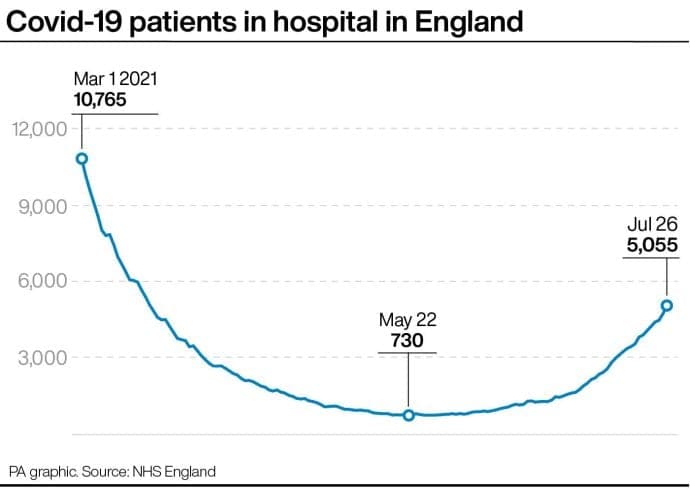Editor's note, 27 July 2021: This article was updated with today's daily data.
These are the UK coronavirus stories you need to know about today.
Pandemic Training Burnout
A GMC survey of more than 63,000 trainees and trainers highlights how the pandemic increased burnout among doctors.
A third of trainees said they felt burnt out to a high or very high degree, up from around a quarter in previous years.
Chief Executive, Charlie Massey, said: "It is not surprising that burnout has worsened during the pandemic, but we cannot expect doctors to continue to operate at this level of intensity. As health services emerge from COVID pressures will remain, but we must not risk reversing the gains that have been made in recent years.
"The danger is that, unless action is taken, workloads and wellbeing will continue to suffer, and future burnout rates could get even worse. As we move on from the pandemic, it is vital that doctors’ training and wellbeing needs are central to service recovery plans. This year’s results should be a blip caused by COVID, not part of a new normal."
NHS Stretched Again
While COVID-19 daily cases have been falling for the last 6 days, hospital admissions have been rising and have reached 5238 across the UK, including 5055 in England. There are 715 UK ventilator beds in use.

NHS Providers has written to the Government to warn that over the past month, the NHS has become as stretched as it was at the height of the pandemic in January, and the situation is likely to worsen.
Chief Executive, Chris Hopson, said: "Many NHS chief executives believe the next phase of our fight against COVID-19 is likely to be the hardest yet given the scale and breadth of pressures they face."
Deaths
Office for National Statistics (ONS) data for deaths in England and Wales registered in the week ending 16 July were 4.8% above the 5-year average (447 more deaths).
COVID-19 accounted for 2.2% of all deaths.
A further 131 deaths were reported today.
Dr Yvonne Doyle, medical director, Public Health England, said: "Rates are still high and the pandemic is not over yet, today we have recorded the highest number of deaths since March.
"This is in part due to the high number of cases recorded in recent weeks. We know deaths follow when there are a high number of cases and data today highlights we are still in the third wave."
Northern Ireland
Northern Ireland's latest lockdown changes come into force at 6pm this evening and include the reopening of theatres and concert venues, and up to 10 people being able to meet indoors.
"The remaining issues still awaiting ratification will be discussed further at Thursday’s Executive meeting when we expect to have a clearer picture of the link between cases and subsequent hospitalisation," a Government statement said.
Reinfection Data
The current UK COVID-19 data dashboard excludes reinfections from daily case data, saying: "People tested positive more than once are only counted once, on the date of their first positive test."
Reinfection data is published separately in weekly surveillance reports but Public Health England is looking to add reinfections to the dashboard in future.
In a statement, PHE said: "We are exploring what criteria should be used to include reinfection data on the dashboard. Reinfections remain a small proportion of the total number of cases and need to be understood and interpreted with caution, rather than being a top line metric. As of 4 July, there have been 23,105 possible reinfections out of 4.3 million first infections (less than 1%). It should be noted that many individuals were not tested in the first wave."
Unsuccessful Shielding
Shielding was not as successful as expected, with higher rates of infection and death among those advised to shield than among non-shielders, according to a University of Glasgow study published in Scientific Reports.
Compared to low-risk individuals, shielders in NHS Greater Glasgow and Clyde were eight times more likely to have confirmed infections, and five times more likely to die following confirmed infection.
The authors concluded that shielding may be best seen as an intervention alongside other population-wide measures.
The Welsh CMO is writing to everyone on the clinically extremely vulnerable list to explain that shielding is not being reintroduced at this time. However, people on the list are being advised to take extra care to minimise their exposure risk.
Loneliness
UCL and University of Manchester research suggests that 33% of older people in England's poorest areas felt isolated and lonely during the first lockdown compared with 16% in the richest areas.
Data came from 4709 adults enrolled in the English Longitudinal Study of Ageing (ELSA).
UCL' s Professor Andrew Steptoe said: "Social distancing strategies were very important for older adults, who were particularly vulnerable to COVID-19.
"However, this may have meant that older adults found it particularly hard to maintain social connections because of lower access to and use of digital technologies, and because of the greater likelihood of needing to socially isolate in addition to social distancing.
Avoiding Plague
The Oxford Vaccine Group has begun a phase 1 trial of a plague vaccine based on its ChAdOx1 adenovirus viral vector platform used against COVID-19.
Director, Professor Sir Andrew Pollard, said: "The coronavirus pandemic has shown the importance of vaccines to defend populations from the threat caused by bacteria and viruses. Plague threatened the world in several horrific waves over past millennia, and, even today, outbreaks continue to disrupt communities. A new vaccine to prevent plague is important for them and for our health security."
Graphics credit: PA Media
See more global coronavirus updates in Medscape’s Coronavirus Resource Centre.





